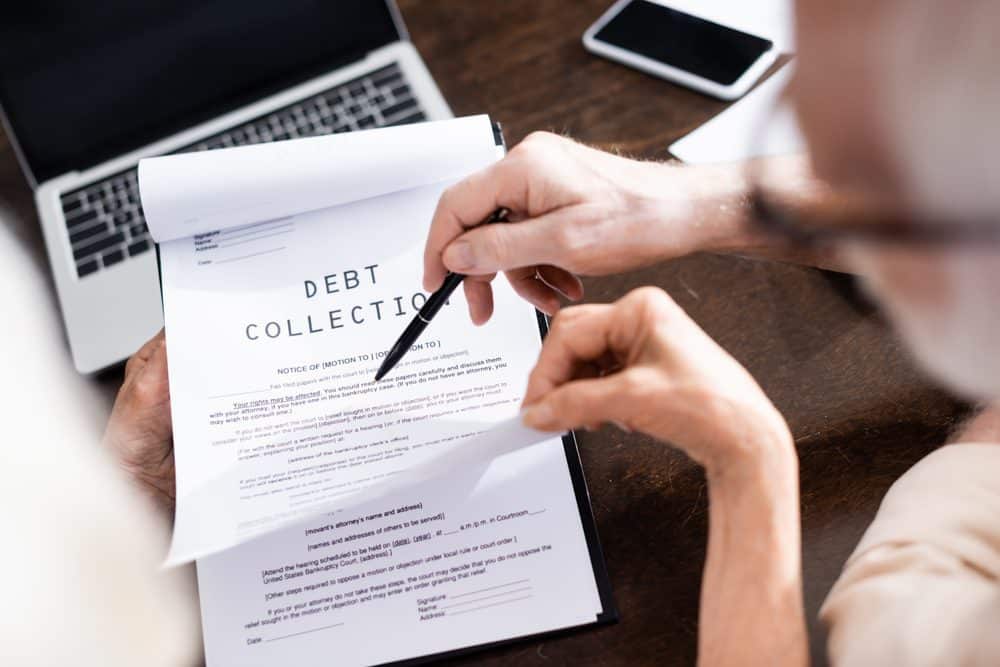What Is the Debt Collection Process? The debt collection process in UAE can be a complex and time-consuming process. This is due to a number of factors, including the strict legal system, cultural norms, and the high value placed on maintaining business relationships.
In this article, Our best debt collection lawyers will explore the debt collection process in UAE, including successful debt collection techniques that can be taken to recover outstanding debts.
Keep Uncovering About: Joint Ownership Provisions Principles

What is Debt Collection Procedure in Dubai?
Under the UAE debt collection laws, the Debt recovery process in Dubai is a legal process of collecting outstanding debts from individuals or businesses who have failed to pay their debts on time. The process involves a series of steps that creditors and debt collection agencies follow to recover the money owed.
Here are the typical steps involved in the debt collection process in the UAE:
1- Contacting the debtor
The first step in the debt collection process is contacting the debtor. Creditors or debt collection agencies in Dubai will reach out to the debtor through phone calls, emails, or letters to remind them of the outstanding debt.
2- Sending a legal notice
If the debtor does not respond to the initial contact, creditors may send a legal notice informing them of the outstanding debt and requesting payment within a specified time frame.
3- Filing a case with the court
If the debtor fails to respond to the legal notice or refuses to pay, the creditor or debt collection agency can file a case with the UAE courts. The court will issue a summons to the debtor to appear in court and defend themselves against the debt claim.
4- Obtaining a judgment
If the court finds in favor of the creditor, a judgment is issued against the debtor, and they are legally obliged to pay the outstanding debt.
5- Executing the judgment
After obtaining a judgment, the creditor can execute it by obtaining a court order to seize the debtor’s assets or bank accounts. The court order may also allow the creditor to garnish the debtor’s wages or deduct payments from their bank accounts until the debt is repaid.
It is important to note that debt collection in UAE is regulated by the Central Bank of the UAE and the UAE Penal Code, which sets out the legal framework for debt collection activities. Debt collectors must follow the guidelines set by these regulatory bodies and adhere to the rules and regulations to avoid any legal issues.
Know more about Debt Collection Services in UAE
How To Know If You Have Debt Collection in Dubai?
If you are living or have previously lived in Dubai, there is a possibility that you may have some outstanding debts that need to be repaid. Debt collection is a common issue in Dubai, as the city has a high number of expatriates who often take out loans, credit cards, and other forms of credit.
To know if you have debt collection in Dubai, you can follow these steps:
- Check your credit report: Your credit report is a summary of your credit history and provides information on any outstanding debts you may have. You can obtain a copy of your credit report from the Al Etihad Credit Bureau (AECB) website by paying a fee.
- Contact your bank or lender: If you have taken out a loan or have a credit card in Dubai, you can contact your bank or lender to inquire about any outstanding balances. They will be able to provide you with information on your current balance, due dates, and any penalties or interest charges that may have accrued.
- Check for communication from debt collectors: If you have outstanding debts, you may receive communication from debt collection agencies in Dubai. They may send letters, emails, or make phone calls to request payment for your outstanding balance.
- Check court records: If your debts have been referred to the courts, you can check court records to see if any legal action has been taken against you. The Dubai Courts website provides information on all cases filed in the courts.
If you have any outstanding debts, it is important to address them as soon as possible to avoid legal action and further financial issues. You can contact your bank or lender to set up a payment plan or seek advice from a financial advisor or debt counselor to help you manage your debts effectively.
Learn More About: UAE Evidence Law | Everything You Need to Know About Evidence Law

What is the punishment for not paying loan in UAE?
Failing to pay a loan in UAE is a serious offense and can result in legal action being taken against the borrower. Here are some of the possible consequences of not paying a loan in the UAE:
- Legal action: If a borrower fails to pay their loan, the lender can take legal action against them. This can result in the borrower being taken to court, and if they are found guilty, they may be ordered to pay the outstanding amount plus legal fees and other costs.
- Blacklisting: A borrower who fails to pay their loan can also be blacklisted by the UAE credit bureau. This means they will have a negative credit history, which can make it difficult for them to obtain credit in the future.
- Imprisonment: In extreme cases, a borrower who fails to pay their loan can be sentenced to imprisonment. According to the UAE Penal Code, a person who issues a bad cheque or fails to repay a debt can face a jail sentence of up to three years.
- Travel ban: A borrower who fails to pay their loan can also face a travel ban, which means they will not be allowed to leave the country until they have paid off their debt.
It is important to note that the punishment for not paying a loan in the UAE can vary depending on the circumstances of the case and the amount of money involved. Borrowers who are struggling to make loan payments should contact their lender as soon as possible to discuss their options and avoid legal consequences.
Read more about What Is a Debt Collection Agency?
FAQ about debt recovery UAE | Debt collection in Dubai
1- What is the most effective way to collect a debt?
Act immediately to identify possible problematic debtors.
- dealing with past-due payments.
- Get in touch with your client.
- Hire debt collection attorneys or debt collectors.
2- What is debt collection?
Debt collection refers to the methodical pursuit and recovery of overdue debts from either individuals or corporations. On behalf of the primary creditor, it entails the steps taken by creditors or third-party collection agencies to recover unpaid debts. Communication attempts to reach out to debtors and remind them of their financial commitments are usually how debt collection starts. Emails, letters, and phone calls might all be part of this campaign.
More forceful actions, such as arranging repayment arrangements, making settlement offers, or, in the worst circumstances, starting legal procedures, may be pursued if the first few attempts are unsuccessful. The goal of debt collection is to collect the debt and end the debtor and creditor’s financial responsibility to one another.
3- How to deal with debt collectors in UAE?
- Stay calm and composed.
- Request written documentation of the debt.
- Understand your rights as a debtor.
- Maintain written communication.
- Negotiate a repayment plan.
- Seek legal advice if needed.
- Report violations.
Conclusion
debt collection in UAE is a serious matter that should not be taken lightly. Defaulting on a loan can result in legal action, blacklisting, imprisonment, and a travel ban. It is important for borrowers to be aware of their obligations and to take action if they are struggling to make payments.
Seeking the assistance of a debt collection agency in Dubai or the best debt collection attorney can help borrowers navigate the debt collection process and find a resolution that is fair to all parties involved. By being proactive and communicating with lenders, borrowers can avoid the negative consequences of defaulting on a loan and protect their financial future.
Get More Insights About: Highlights of the Criminal Procedures Section of UAE Federal Law No. 17 of 2018




I’d like to obtain a demand letter for debt payment to an individual? How do I start the process?
I have knowledge about debt collection